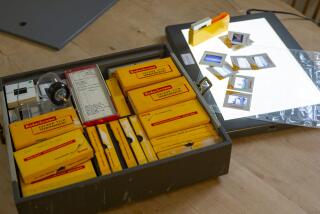Reading -- and thinking -- about memory
It’s been an interesting week for reading about memory. First, there was Jill Lepore’s terrific piece in the New Yorker about the Internet Archive, which is, perhaps, my favorite destination on the Web. Then, Wednesday morning came an essay at Ploughshares by Megan Mayhew Bergman called “The Writer as Collector,” which examines what Walter Benjamin once called “our mysterious relationship to ownership.”
“It doesn’t take a philosopher-king,” Bergman observes, “to determine that people are compelled to line their nests with stuff — items that may be valuable but useless, items that reflect our individual aesthetic, transport us, and speak to poetic possibilities. We are often thinking not just about what we have been, but about who we might become.”
Memory, then, is not just a signifier of the past but also of the future, a way of looking backward and forward at once.
The Web, of course, promises to be a receptacle for everything — every loose thought or image, every impulse, every recollection, all the loose stuff that we’ve ever seen or heard.
I think of Nathanael West, who in his 1939 novel “The Day of the Locust,” describes a studio backlot as “the final dumping ground. He thought of Janvier’s ‘Sargasso Sea.’ Just as that imaginary body of water was a history of civilization in the form of a marine junkyard, the studio lot was one in the form of a dream dump. A Sargasso of the imagination! And the dump grew continually, for there wasn’t a dream afloat somewhere that wouldn’t sooner or later turn up on it, having first been made photographic by plaster, canvas, lath, and paint. Many boats sink and never reach the Sargasso, but no dream ever entirely disappears.”
I once imagined this as a perfect metaphor for the Internet, with its blind alleys and endless storage, a dream dump in the most fundamental sense. More accurate now, I think, is Lepore’s description of it as existing “in a never-ending present. It is — elementally — ethereal, ephemeral, unstable, and unreliable.”
Part of the issue, she argues, is link rot, deletions, corporate reconfigurations: all the enemies of memory. Despite our belief that “stuff on the Web lasts forever, for better and frequently for worse: the embarrassing photograph, the regretted blog,” the truth is very different. “The average life of a Web page,” Lepore writes, “is about a hundred days.”
On the one hand, this is due to our obsession with speed, with reacting, immediately, to everything, even if we haven’t had a chance to think it out. Even more, it is a matter of overload, our inability to keep track.
Twitter, Lepore points out, “has arranged to archive all of its tweets at the Library of Congress” — but if that seems an antidote to the problem of erasure, it raises its own set of issues … as in, who would want to wade through it all? Most days, it’s all I can do to dig down a couple of screens in my own feed, so full is it of come-ons and self-congratulatory look-at-me. Do we really need to hang on to any (or all) of it? How much do we care?
Were this any other medium, we would take that for granted. It’s what Bergman is describing: a kind of mnemonic selectivity. For her, the detritus she gathers — “[q]uilts, jadeite bowls, glass bottles, chairs worthy of a napping cat and a writer working with a baby asleep on her shoulder” — becomes a strategy for marking not only aesthetics, but also identity.
“I do not find it unusual,” she explains, “that many writers I know acquire vintage clothes, buy old homes, and rescue animals. … Our job, after all, is to make up lives, engage in epic games of pretend.”
And yet the Internet also promises to function as a memory (albeit a collective one, some sort of externalized Jungian unconscious), even if that promise is illusory.
At heart, I think, this makes for a tension between personal and (let’s call it) social recollection, what matters to us internally and what the culture will bear. This has long been the tension of the Internet or, more broadly, the digital realm.
Increasingly, we give our memory over to machines, to our belief that they are infallible, that the grid will not go down. Consider our panic when we can’t get online, when Facebook freezes, as it did on Monday, when what we expect — the externalization of the personal — is not accessible as we demand.
I no longer remember (nor even try to) phone numbers, addresses, bits of quotation, song lyrics, because I no longer have the need. Or at least, that is my faith. I can look them up or tell my machines to do it for me; I have outsourced that aspect of my memory.
Still, if Lepore or Bergman’s pieces have anything to tell us, it’s that memory, and what we do with it, remains an idiosyncratic thing.
“I want to believe,” Bergman writes, “that you can look at my hand-painted trays, second-hand china, ikat tablecloths, goats in dog collars, and the spaniel with an underbite hunting rabbits in my backyard, and know something about who I am. Who I think I am, now, as a writer, mother, and farmer.”
Who I think I am — yes, exactly. Memory as an essential, perhaps the most essential, component of personality … even, or especially, as it fades.
Twitter: @davidulin
More to Read
Sign up for our Book Club newsletter
Get the latest news, events and more from the Los Angeles Times Book Club, and help us get L.A. reading and talking.
You may occasionally receive promotional content from the Los Angeles Times.







